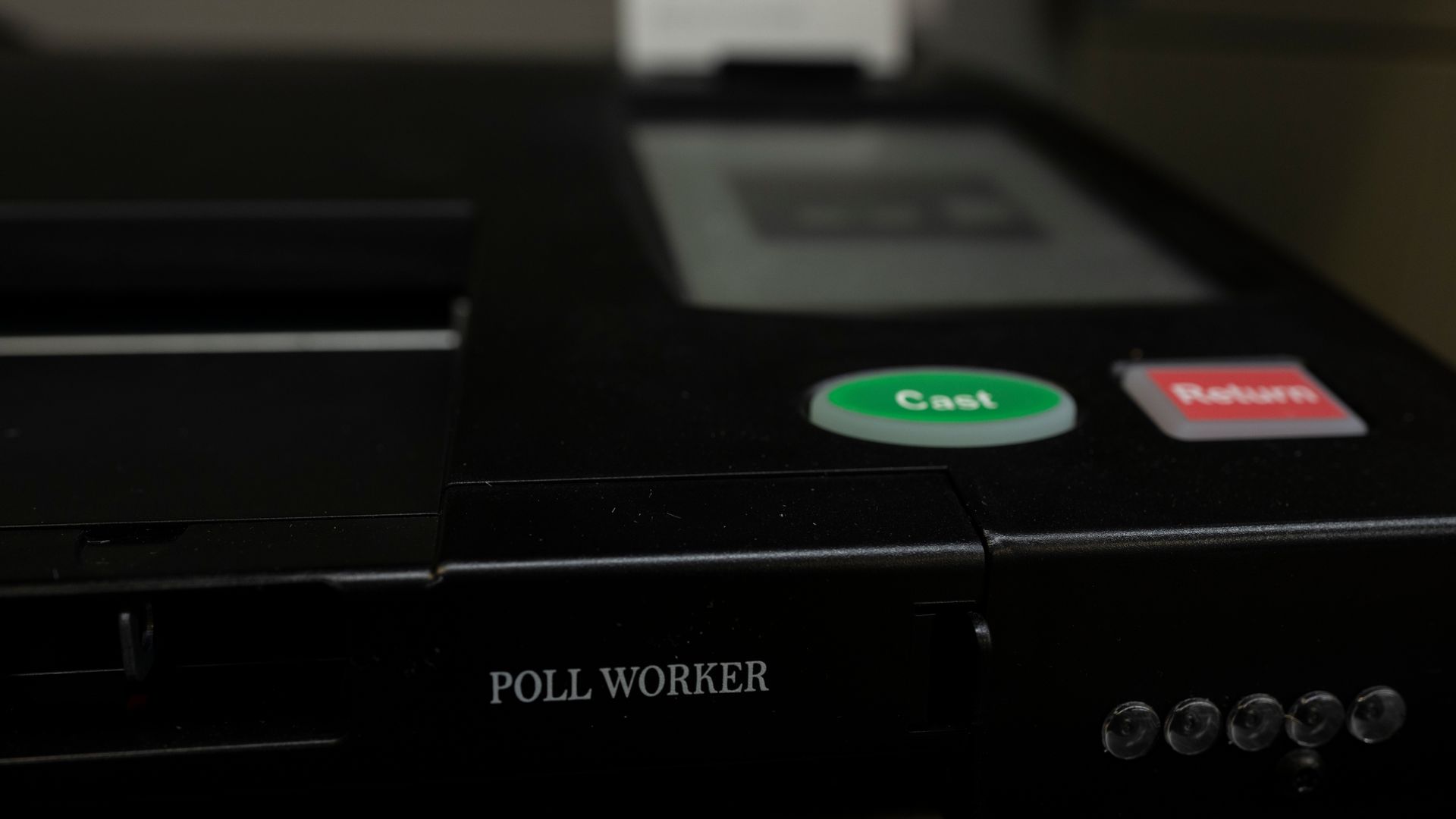
Electronic voting expands as FBI raises concerns about security issues
By Karah Rucker (Anchor), Evan Hummel (Producer), Jake Maslo (Video Editor)
In less than five months, tens of millions of Americans will cast their ballots in what could be a contentious presidential election. More than 30 states and the District of Columbia currently offer electronic voting for U.S. military and overseas voters. However, some states recently expanded electronic ballot returns for people with disabilities. Now, Nevada is believed to be the first state to give this option to native tribes on reservations and colonies.
Media Landscape
This story is a Media Miss by the right as only 4% of the coverage is from right leaning media. Learn moreBias Distribution
Left
Right
Untracked Bias
While some see expansion of electronic voting as making electoral rights more equal, others warn of the security risk of expanding electronic voting.
The Federal Bureau of Investigation and other U.S. government agencies recommend keeping the practice limited, calling electronic ballot return a “high risk” that should be used only by voters who have no other means to cast their ballot.

Download the SAN app today to stay up-to-date with Unbiased. Straight Facts™.
Point phone camera here
Election officials also reportedly worry about what could happen to the ballot in-transit electronically. Some officials have suggested that the best method is for voters to print out electronic ballots and mail them in. Others pointed out that there are not federal guidelines for electronic voting, despite efforts to create guidelines in 2022.
Not all states are buying into the electronic voting process. In Minnesota, officials considered implementing the practice, but eventually decided against it.
“In light of recent security concerns, it’s on ice,” Minnesota Secretary of State Steve Simon said. “Some day, if those security considerations are addressed and if the concerns and objections of the federal agencies can be overcome, we would definitely consider it because as a matter of convenience, it would probably make a difference.”
Still, Nevada Democratic Secretary of State Cisco Aguilar maintained that his state’s system is safe and regulated. He told The Associated Press that he is confident in Nevada’s authentication and verification of eligible voters. Aguilar said that Nevada’s electronic voting has regular security reviews and updates to system.
Despite concerns, states with both Democratic and Republican governors allowed electronic ballot returns, with different stipulations. For instance, Alaska, California, Florida and Oklahoma limit the process to military and overseas voters and only allow return by fax. In Texas, astronauts are allowed to cast their votes through an online portal. In West Virginia, first responders on duty are also able to cast their votes electronically.
Unbiased news.
Directly to your inbox. Free!
Learn more about our emails. Unsubscribe anytime.
By entering your email, you agree to the Terms & Conditions and acknowledge the Privacy Policy.
West Virginia Secretary of State Mac Warner is a supporter of electronic voting.
“Having been in the military, I’ve seen intelligence transmitted via the internet. We transmit nuclear codes via the internet,” Warner said. “If we can do that, we certainly can get a secure ballot and transmit across the internet.”
[KARAH RUCKER]
TENS OF MILLIONS OF AMERICANS WILL CAST THEIR BALLOT IN WHAT COULD BE A CONTENTIOUS PRESIDENTIAL ELECTION IN LESS THAN FIVE MONTHS.
SOME IN PERSON, SOME THROUGH THE MAIL– AND SELECT CITIZENS ELECTRONICALLY VIA EMAIL, FAX OR ONLINE PORTALS.
MORE THAN 30 STATES AND D-C ARE OFFERING ELECTRONIC VOTING FOR U-S MILITARY AND OVERSEAS VOTERS.
SOME STATES HAVE EVEN EXPANDED ELECTRONIC BALLOT RETURNS FOR PEOPLE WITH DISABILITIES.
[RAMONA COKER]
“THE FURTHER I GOT IN MY VISION, THE MORE DIFFICULT IT BECAME TO VOTE.”
“WITH THIS NEW SYSTEM THAT WE HAVE IN THE STATE OF NEVADA, IT HAS MADE IT A LOT EASIER.”
[KARAH RUCKER]
NEVADA IS ALSO THE FIRST STATE TO GIVE THIS OPTION TO NATIVE TRIBES ON RESERVATIONS AND COLONIES.
WHILE SOME SEE IT AS MAKING VOTING RIGHTS MORE EQUAL– OTHERS WARN OF THE SECURITY RISK OF EXPANDING ELECTRONIC VOTING.
THE F-B-I AND OTHER AGENCIES RECOMMEND KEEPING THE PRACTICE LIMITED.
CALLING ELECTRONIC BALLOT RETURN “HIGH-RISK” THAT SHOULD BE USED ONLY BY VOTERS WHO HAVE NO OTHER MEANS.
ELECTION OFFICIALS WORRY ABOUT WHAT COULD HAPPEN TO THE BALLOT IN-TRANSIT ELECTRONICALLY.
WITH SOME BELIEVING THE BEST METHOD IS FOR VOTERS TO PRINT OUT ELECTRONIC BALLOTS AND MAIL THEM IN.
OTHERS HAVE POINTED OUT THERE ARE NO FEDERAL GUIDELINES FOR ELECTRONIC VOTING– DESPITE EFFORTS IN 2022 TO CREATE THEM.
STILL, NEVADA SECRETARY OF STATE CISCO AGUILAR MAINTAINED HIS STATE’S SYSTEM IS SAFE AND REGULATED.
[CISCO AGUILAR]
“I AM CONFIDENT IN OUR SYSTEM. ONE IS THE VERIFICATION PROCESS, BUT IT’S ALSO DUE TO BEING ABLE TO VALIDATE THE VOTER IN A SECURE WAY.”
[KARAH RUCKER]
AGUILAR SAYS NEVADA’S SYSTEM HAS REGULAR SECURITY REVIEWS AND UPDATES.
FOR MORE ELECTION STORES– AND THE PRESIDENTIAL RACE– CLICK ON SAN-DOT-COM OR DOWNLOAD THE STRAIGHT ARROW NEWS APP.
Media Landscape
This story is a Media Miss by the right as only 4% of the coverage is from right leaning media. Learn moreBias Distribution
Left
Right
Untracked Bias
Straight to your inbox.
By entering your email, you agree to the Terms & Conditions and acknowledge the Privacy Policy.
MOST POPULAR
-
 Getty Images
Getty Images
DOJ investigating UnitedHealth over Medicare Advantage billing: Report
Read5 hrs ago -
 Reuters
Reuters
Diddy’s defense attorney abruptly requests withdrawal from case
Watch 1:4017 hrs ago -
 Getty Images
Getty Images
Judge allows CNN lawsuit potentially worth billions to continue
Read21 hrs ago -
 Reuters
Reuters
It’s a bird, it’s a plane, it’s the first video of Alef Aeronautics’ flying car
Watch 2:1322 hrs ago




